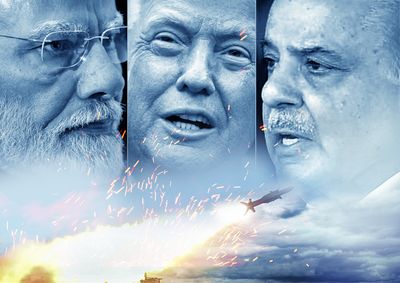RECIPES AND DIPLOMATIC notes often confuse me. The language is only for practitioners and not for the public. And when you understand the language, you realise that some things are not as grand as they sound. Mulligatawny soup is an example. Nine times out of ten, it has tasted like the humble and wholesome pepper rasam to me. Gourmets may haul me over the coals for saying this.
Diplomatese does the same. For example, translate this: “We have some reservations regarding certain aspects of the proposal, and we believe that further discussion is warranted.” Translation: “We disagree.” When I listen to President Donald Trump, I see a man who speaks without filters of any sort. Not that it is a good thing, as we saw in the aftermath of Operation Sindoor. So, diplomatese is a good strategy sometimes. A better one would be to know when to keep one’s mouth shut.
On May 10, Trump promised that he “will work with (India and Pakistan) to see if, after a thousand years, a solution can be arrived at, concerning Kashmir.” The Kashmir issue is only 75 years old and not “a thousand years” old as he has said for the second time. But who will tell Trump? And, will he heed?
India has traditionally maintained that talks with Pakistan will be bilateral. So, no one else has any formal role in that conversation until that policy is revised. To top it all, Prime Minister Narendra Modi made it clear in his address this week that two core areas of that conversation will be terrorism and Pakistan-occupied Kashmir. This week’s cover was born in the background of these complexities.
The main article was written by Senior Assistant Editor Sanjib Kr Baruah and Chief of Bureau Namrata Biji Ahuja, and we have expert voices in columns by former ambassador K.C. Singh and Turkish political scientist Nuray Mert and an interview with former Union minister and editor M.J. Akbar.
Another major section in this issue is our annual special on India’s best universities, written by Principal Correspondent Abhinav Singh. The article looks at how universities are encouraging experiential learning and AI literacy.
The article is bolstered by THE WEEK-Hansa Research Survey 2025 on India’s best universities and interviews with Vice Chancellor Santishree Dhulipudi Pandit of Jawaharlal Nehru University and Director Rangan Banerjee of IIT Delhi.
An exclusive we have this week is an article by Fr Miguel Angel Martin Juarez OSA, who was the general secretary of the Order of St Augustine when Fr Robert Francis Prevost, now Pope Leo XIV, headed the order. And another article where Correspondent Nirmal Jovial spoke to Fr Alexander Palliparambil, an Augustinian and an academic, who won a bottle of champagne in a bet over who would become the pope.
I’ll stop with @leisure, where the Malayala Manorama’s Special Correspondent R.S. Santhosh Kumar has skilfully brought the equally poignant and inspiring story of writer Banu Mushtaq, whose anthology Heart Lamp has been shortlisted for the International Booker Prize 2025.
In the interview, Banu, who is a year younger than me, narrates the fights with and the affection she has for her husband, Mushtaq Mohiyuddin. They clearly complete each other. Nevertheless, Santhosh writes that her plea to God in the last story of Heart Lamp is this: “Come to Earth as a woman, Prabhu! Be a woman once, O Lord!”
I am sure that, for various reasons, many women would have echoed Banu’s prayer.


